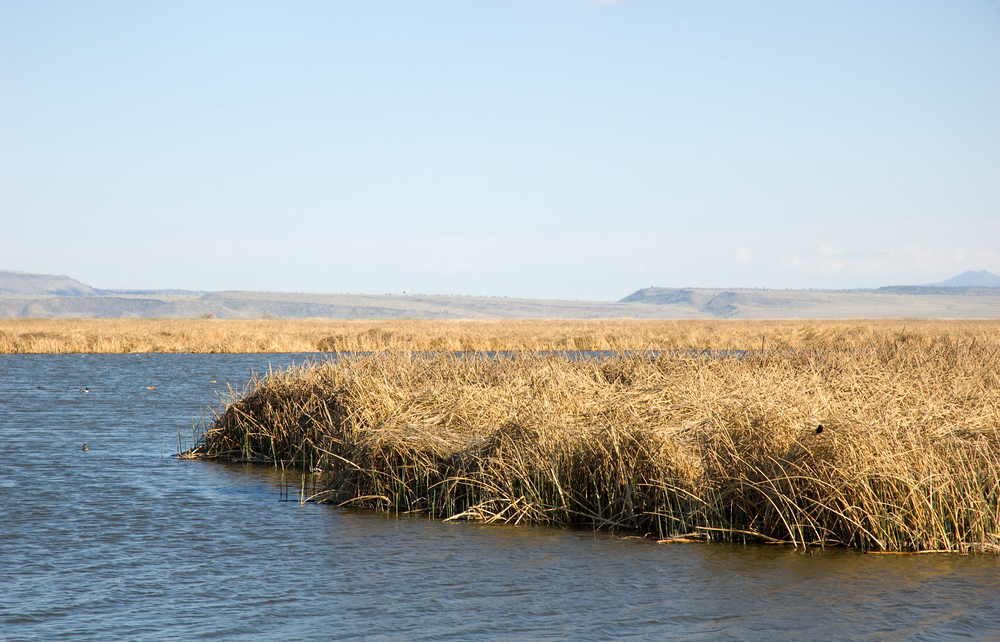Members of the Klamath Tribal community argue that the federal government prioritizing agriculture comes at the expense of native fish populations.

In the Klamath Basin, more than 1,000 farmers and ranchers draw water from the Klamath River, which flows through southern Oregon and northern California, from the Upper Klamath Lake to the Pacific Ocean. But they are far from the only ones who rely on it as a water source. Native species and tribes have long relied on it for day-to-day survival.
As the area heads into another year of extreme drought, the US government recently announced plans to release water from a federally regulated reservoir to downstream farms, in hopes of relieving the water shortage they are facing yet again.
The decision, made by the Bureau of Reclamation, has left the native Klamath tribes in Oregon assessing their legal options to stop the plan. The tribes say giving the water to farms would put two endangered fish species—both the C’waam (Lost River sucker fish) and the Koptu (shortnose sucker fish)—in serious danger of extinction. Even releasing enough water for limited irrigation on the 300 square miles of cropland that rely on Klamath River water would be detrimental to the fish, as the water withdrawal will take place at the height of spawning season, according to Katu News.
Released in mid-April, the Bureau’s plan involves sending 50,000 acre-feet (one acre-foot is the amount of water needed to cover one acre of land with one foot of water) of water to farmers downstream. Even with the water allotment, the 1,000 farmers that would benefit would still only be getting 15 percent of what they’d have in a normal year.
[RELATED: California Wants to Pay Farmers to Not Farm This Year]
The 257-mile Klamath River does not supply enough water in a decent year to meet the needs of both farms and protect the native species. But the region hasn’t seen a “good” year in three years. In fact, the water crisis was so bad in 2021 that the Klamath Reclamation Project’s main irrigation canal ran dry. With no water released from the reservoir, thousands of juvenile salmon died out, and the culturally important sucker fish species were kept from spawning.
In response to the plan, members of the Klamath Tribal community protested in the Bureau of Reclamation’s parking lot on April 15, where they emphasized that the water release violates the Endangered Species Act (ESA) and called for a stable solution to the water crisis that does not threaten native wildlife.
The ESA requires that Upper Klamath Lake—the body of water in the region with the highest number of the species left—remains at an elevation of 4,142 feet above sea level during April and May so the endangered fish can access the area on the lake where they spawn, a number the Reclamation failed to meet in both 2020 and 2021. This year, the lake is sitting at more than a foot below that required level.
The endangered fish once populated the area’s waterways in the millions and were a primary food source to the Klamath and Modoc people before the region was developed into agricultural land and the natural habitat was drained and subjected to toxic algae blooms, which contributed to the fish dying off. As a result, the native tribes haven’t been able to fish for the species since 1986.
In a statement, the Klamath Tribes said that the decision to release the water to the farms as part of the agricultural project is “perhaps the saddest chapter yet in a long history of treaty violations.”
Tired of hearing the decisions are simply a result of “another bad water year,” the statement goes on to contribute the water crisis to greater causes. “This disaster is the entirely predictable and the inevitable consequence of multi-generational mismanagement and poor judgment. Neither the Klamath Tribes nor our downriver tribal brothers and sisters made any of the decisions that brought us here,” the statement says.